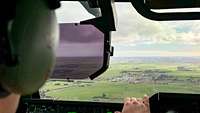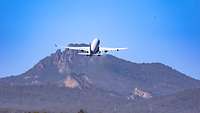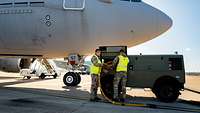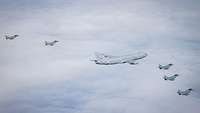
First visit of German Air Force to New Zealand
Premiere: The German Air Force is visiting the island state of New Zealand in the Indo-Pacific region. Why does this happen?


Amberley, Australia: More than three flight hours away from the German exercise contingent, 40 servicemen and women of the Multinational MRTTMulti Role Tanker Transport Unit (MMU) with two of their total of eight A330 MRTTMulti Role Tanker Transport tanker aircraft found their home for the Pitch Black 24 large-scale exercise. What is their mission?

The tanker aircraft and crews of the MMU now also take part in the Pitch Black 2024 exercise after having supported the German and Spanish Eurofighters on their flight from Alaska via Japan to Australia.
MMU/Maike LauerThe apron of the military airport in Amberley, Australia, provides an impressive view: A total of eight tanker aircraft from Australia, France, Singapore, Italy, the United Kingdom and the MMU are lined up in a narrow space. They are ready to supply kerosene to the combat aircraft participating in the Pitch Black 24 exercise, thus extending their training time in the air many times over. The tanker aircraft are also coordinated here in a multinational cell.
But let’s start at the beginning: International operations and European participation in exercises like Pacific Skies 24 would not be possible without the support of tanker aircraft such as the A330 MRTTMulti Role Tanker Transport. This is where the MMU comes into play. The MMU is a multinational project with six participating nations (Germany, the Netherlands, Belgium, Norway, Czechia and Luxembourg) and currently operates eight tanker aircraft from its Main Operating Base (MOB) in Eindhoven, the Netherlands, and a Forward Operating Base (FOB+) in Cologne-Wahn. Its mission: Global and reliable air refuelling for their partner nations, transport of personnel and materiel, and 24/7 strategic aeromedical evacuation (StratAirMedEvacStrategic Air Medical Evacuation) readiness.
Since 28 July, the unit has been deployed continuously with up to four tanker aircraft simultaneously in the Pacific Skies 24 global deployment exercise. The A330 MRTTMulti Role Tanker Transport of the MMU are the backbone of the exercise and support the German, French and Spanish Eurofighter and Rafale combat aircraft, in particular in the deployment between Europe, Canada, Alaska, Japan, Australia and beyond. A unique feature of the unit plays an important part during the Arctic Defender exercise in Alaska and Pitch Black 24 exercise in Australia: Its aircraft are equipped in such a way that they can refuel almost all aircraft types used by NATONorth Atlantic Treaty Organization member states.
The MMU was established on 10 July 2019 following an initiative of the Netherlands, which had proposed the idea of European cooperation while searching for a successor for their old KC-10 tanker aircraft. Against this background, participation in an exercise like Pitch Black 24 is particularly valuable for this very young unit.
“We can learn a lot from our partners here. The Australians in particular have a lot of experience in tanker aircraft operations,” explains Squadron Leader Marius, Detachment Commander of the MMU. “In addition to the missions during Pitch Black 24, various workshops and forums are held here in Amberley where we exchange ideas with the other units. Airbus is also present on site with a simulator. We can learn a lot from each other and everyone brings their experiences to bear.”
There is no language barrier. The members of the unit are accustomed to using a foreign language while performing their daily duty. The aircrews, engineering teams and staff and planning elements are mixed teams consisting of soldiers from the six MMU partner nations. And although 25 of the 40 exercise participants come from Germany, the language spoken in the unit is English. Some of the soldiers are already taking part in Pitch Black for the second time, most recently in Darwin in 2022 during the Rapid Pacific deployment. “These exercises are always a good opportunity to form international friendships. The outstanding hospitality of the Australians, their friendliness and openness create an atmosphere in which we can grow not only professionally but also personally,” says Squadron Leader Marius.

Cooperation: In the MMU, specialists from different nations work hand in hand.
MMU/Maike Lauer
In their trail missions, the tanker aircraft of the MMU enable the Eurofighters to safely reach their destination over long distances. The A330 MRTTMulti Role Tanker Transport has a capacity of around 110 tons of fuel that can be shared with the receivers.
MMU/Maike Lauer